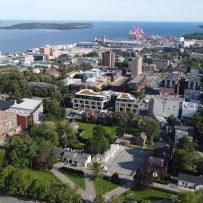NOVA SCOTIA TO OVERHAUL PUBLIC HOUSING RENTS: WHAT YOU NEED TO KNOW

Nova Scotia is overhauling its public housing rent system, transitioning fixed-rate rents to an income-based model for over 1,400 tenants.
The changes will mainly affect tenants with higher incomes, who will see their rents rise gradually over the next few years.
Housing minister John Lohr said the new model aims to create a “fairer and more consistent” system.
Under the new system, tenants with higher incomes will see their rent increase by 5% annually for the first three years. In the fourth year, their rent will increase to meet the cap, which is 30% of gross income for single people and 25% for families.
Pamela Menchenton, director of client services at the Nova Scotia Provincial Housing Agency, explained the rationale behind the change.
“We’re trying to level the playing field for everyone who is in our housing,” Menchenton told The Canadian Press. “We have people in the same community, maybe the same building or the same floor, who are paying 5% of their income, whereas most of our tenants would be paying 30%. We want a fair approach.”
The fixed-rent leases, ranging from $400 to $680 per month, are a legacy from previous programs dating back 30 years. Most public housing tenants (87%) already pay rent geared to their income, which is the standard model across Canada.
About 75% of fixed-rent tenants will see their monthly rent increase by an average of $96 after four years of phased-in increases, while the remaining tenants will see decreases. The province expects to collect an additional $400,000 in rent, which will be offset by $3 million in additional heating expenses covered for those moving to the income-based system.
The changes will be phased in starting November 13.
“We know that this will be an adjustment for tenants,” Minister Lohr said. “We are taking significant steps to build more public housing and modernize the public housing program to respond to our changing economic landscape and the diverse needs of our growing population.”
Nova Scotia’s 17,500 public housing tenants, about 70% of whom are seniors, currently earn an average of $22,000 annually. However, the authority has identified 15 to 20 public housing units occupied by tenants earning more than $100,000 a year.
People receiving income assistance will not see a change in their rent model. They will continue to pay rental rates based on the number of dependants in their household.


